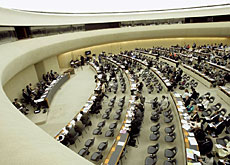Global index puts spotlight on human rights

Nations that fail to tackle human rights abuses can expect to come under closer scrutiny following the launch of an online database developed by Bern University.
Funded by the Swiss government, the SFr450,000 ($370,000) Universal Human Rights Index shows which countries are making progress and which are continuing to flout international conventions.
The database, which took three years to develop, is designed to ease access to documents issued by the seven United Nations human rights treaty bodies and reports commissioned by the new Human Rights Council.
Walter Kälin, the Bern University law professor who headed the project, said the aim was to provide “objective and reliable” information to council members, international institutions, governments, non-governmental organisations and the media.
The index contains 1,000 documents, including all the concluding observations issued by treaty bodies from the year 2000, as well as all reports published this year by UN special rapporteurs.
While these have been accessible via various UN websites, it is the first time they have been presented in such a structured and transparent way.
Kälin sees it being a valuable tool for the UN’s human rights watchdog, for which he drew up the blueprint.
“The Human Rights Council will have to review countries periodically and in order to do that the council will have to base its discussions on reliable information,” he told swissinfo.
Structured approach
Entries for each country are classified by human right, UN treaty body and affected section of the population.
A glance at the website shows 36 entries for Iraq, 71 for Cuba, 203 for Switzerland, 227 for the United States and 475 for China.
However, Kälin said it was important not to jump to conclusions regarding the figures, saying each country required close analysis. Fewer entries did not necessarily mean a lack of compliance and vice versa.
Kälin, who is also the UN secretary-general’s representative on the human rights of internally displaced people, said an internal crisis or lack of capacity might be the reason for failure to cooperate rather than bad will.
“These are all factors to be taken into account and the database helps you to have these discussions. Up to now this has been very difficult just because of the sheer mass of documents that needed to be consulted,” he said.
Blaise Godet, Swiss ambassador to the UN in Geneva, said he expected an accord to be signed within the next few weeks that would see the Office of the High Commissioner for Human Rights take over the running of the index.
swissinfo, Adam Beaumont in Geneva
The index was developed by the institute of public law at Bern University in collaboration with LexUM, Montreal University’s justice system technologies laboratory.
The documents can be searched, depending on the translations made available by the UN, in the six official UN languages (Arabic, Chinese, English, French, Russian, Spanish). The website itself is available in English, French and Spanish.
The seven UN human rights treaty bodies monitoring the implementation of core international human rights treaties and their protocols:
Committee on the Elimination of Racial Discrimination.
Committee on Economic, Social and Cultural Rights.
Human Rights Committee.
Committee on the Elimination of All Forms of Discrimination against Women.
Committee against Torture.
Committee on the Rights of the Child.
Committee on Migrant Workers.

In compliance with the JTI standards
More: SWI swissinfo.ch certified by the Journalism Trust Initiative


You can find an overview of ongoing debates with our journalists here . Please join us!
If you want to start a conversation about a topic raised in this article or want to report factual errors, email us at english@swissinfo.ch.